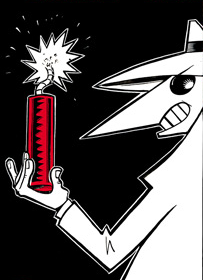Businesses Lobby During "Earth Month" to Protect Plastic Bags
Submitted by Anne Landman on
 The Progressive Bag Alliance, the American Chemistry Council and Wal-Mart Stores were among the parties who successfully lobbied Democratic Pennsylvan
The Progressive Bag Alliance, the American Chemistry Council and Wal-Mart Stores were among the parties who successfully lobbied Democratic Pennsylvan

Submitted by Anne Landman on
 The Progressive Bag Alliance, the American Chemistry Council and Wal-Mart Stores were among the parties who successfully lobbied Democratic Pennsylvan
The Progressive Bag Alliance, the American Chemistry Council and Wal-Mart Stores were among the parties who successfully lobbied Democratic Pennsylvan
Submitted by Diane Farsetta on
 In early 2002, as "detailed planning for a possible Iraq invasion" began, then-Assistant Secretary of Defense for Public Affairs Victoria Clarke launched the Pentagon military analyst program as "the main focu
In early 2002, as "detailed planning for a possible Iraq invasion" began, then-Assistant Secretary of Defense for Public Affairs Victoria Clarke launched the Pentagon military analyst program as "the main focu
Submitted by Diane Farsetta on
The Freedom's Watch Louisiana ad
Submitted by Diane Farsetta on
 Two studies of internal Merck documents concluded that the pharmaceutical company had "violated scientific-publishing ethics by ghostwriting dozens of academic articles, and minimized the impact of patient deaths in its analyses of some human trials." The internal documents surfaced during l
Two studies of internal Merck documents concluded that the pharmaceutical company had "violated scientific-publishing ethics by ghostwriting dozens of academic articles, and minimized the impact of patient deaths in its analyses of some human trials." The internal documents surfaced during l
Submitted by Diane Farsetta on
"Mywireless.org," a group that's "working hard to kill a cell phone reform bill at the Minnesota legislature," describes itself as "a non-profit consumer advocacy organization" formed to protect cell phone users' "freedom, value, security and mobility." But it's "staffed almost entirely by telecommunications industry executives, drawn mainly from the ranks of the
 If Cara Schaffer contacts you, be wary. Take emails and online comments from "activist2008" and "stopcorporategreed" with a grain of salt. Londoners, be on the lookout for Toby Kendall, a.k.a. "Ken Tobias." And activists everywhere should think twice before putting documents in the recycling or trash bins.
If Cara Schaffer contacts you, be wary. Take emails and online comments from "activist2008" and "stopcorporategreed" with a grain of salt. Londoners, be on the lookout for Toby Kendall, a.k.a. "Ken Tobias." And activists everywhere should think twice before putting documents in the recycling or trash bins.
Over the past week, reporters and activists outed three different corporate spying operations. As John Stauber and Sheldon Rampton wrote in their 1995 book "Toxic Sludge Is Good for You!": "Movements for social and political reform have often become targets of surveillance. ... The public relations industry has developed a lucrative side business scrutinizing the thoughts and actions of citizen activists, using paid spies who are often recruited from government, military or private security backgrounds."
Last week's revelations show that these underhanded tactics are very much in use today. And they don't just impact the groups being infiltrated. By privileging corporate interests, effectively giving them the first and last word on an issue, they distort vital public debates.
 Junk mail kills trees, clogs mailboxes, packs landfills, wastes natural resources, and everyone would be glad to be rid of it. Right?
Junk mail kills trees, clogs mailboxes, packs landfills, wastes natural resources, and everyone would be glad to be rid of it. Right?
Well, maybe not.
Whether out of environmental concern or sheer annoyance, legislated efforts to reduce junk mail are on the rise, but companies that have vested interests in its continuance have started organizing to save it--in a big way. Of course, they don't call it junk mail. Their preferred euphemisms are "advertising mail," "direct mail" or even "standard mail."
 The Second Circuit of the United States Court of Appeals missed a great opportunity this week to hold the tobacco industry accountable for one of its worst marketing tactics -- positioning cigarette brands in response to smokers' medical concerns. The April 7, 2008, issue of the New York Times has an article about the dismissal of a huge, class-action lawsuit against the tobacco industry that was brought by smokers of "light" cigarettes who claimed they were misled about the relative safety of "light" cigarettes compared to regular, "full flavor" cigarettes. The suit, and its dismissal by the court, brought to mind a little-recognized tobacco industry marketing survival tactic that weighs heavily on the public's perception of exactly what "light" means.
The Second Circuit of the United States Court of Appeals missed a great opportunity this week to hold the tobacco industry accountable for one of its worst marketing tactics -- positioning cigarette brands in response to smokers' medical concerns. The April 7, 2008, issue of the New York Times has an article about the dismissal of a huge, class-action lawsuit against the tobacco industry that was brought by smokers of "light" cigarettes who claimed they were misled about the relative safety of "light" cigarettes compared to regular, "full flavor" cigarettes. The suit, and its dismissal by the court, brought to mind a little-recognized tobacco industry marketing survival tactic that weighs heavily on the public's perception of exactly what "light" means.
The tobacco industry has long had a remarkable ability to rescue itself from damaging health claims by turning allegations against its products into marketing opportunities. Inside the industry, the fact that cigarettes cause widespread illness and death is referred to as the "smoking and health" issue, or "S&H issue" for short. Tobacco marketers consider "S&H issues" to be little more than "external marketing forces" that require re-positioning of products, through changes in advertising copy strategy, so that smokers will get an illusion of safety from the dangers they perceive.
Submitted by Anne Landman on
 A rock cocaine cigarette filter? A cigarette that delivers birth control and sexual stimulant drugs to the smoker at the same time? A geriatric brand? All of these are actual ideas for new products and promotions that were recorded at cigarette company "brainstorming" meetings.
A rock cocaine cigarette filter? A cigarette that delivers birth control and sexual stimulant drugs to the smoker at the same time? A geriatric brand? All of these are actual ideas for new products and promotions that were recorded at cigarette company "brainstorming" meetings.
Submitted by Diane Farsetta on
 When labor leaders complained about Burson-Marsteller's union-busting work, Burson CEO Mark Penn remained as chief strategist for Senator
When labor leaders complained about Burson-Marsteller's union-busting work, Burson CEO Mark Penn remained as chief strategist for Senator
Center for Media and Democracy (CMD)
520 University Ave, Ste 305 • Madison, WI 53703 • (608) 260-9713
CMD is a 501(c)(3) tax-exempt non-profit.
© 1993-2024